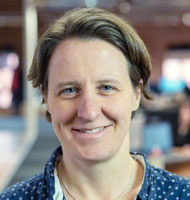Authors: Joanna Welford, CFE Research, Leicester (UK), and Rachel Moreton, CFE Research, Leicester (UK)


When we think about ‘healthier lives’, several things come to mind: physical activity, good mental health, a nutritious diet, getting plenty of sleep. Everyone knows these things are good for your health, and behaviour change interventions abound to encourage people to have a healthier lifestyle.
But the majority of support in this space is targeted at those who have the foundations upon which to build a healthier life – to thrive. What about those who do not have this foundation? People who experience multiple disadvantage have a different starting point, and for staff and services supporting this group, working towards a ‘healthy life’ can look very different.
The Fulfilling Lives programme, with £112 million from the National Lottery Community Fund channelled through 12 voluntary sector-led partnerships across England, aimed to better support people experiencing multiple and severe forms of disadvantage – some of the most marginalised people in society today. Experience of homelessness, mental ill health, substance misuse and the criminal justice system are inter-related and often mutually reinforcing. Yet public services often engage with problems in isolation. People are often bounced from one service to another, unable to get holistic support to work on different areas of their lives simultaneously. Meeting their basic needs – shelter, even survival – is paramount. The Fulfilling Lives programme aimed not just to support individuals but to change the wider system of services too.
A recent special double-issue of Housing, Care and Support shares lessons from Fulfilling Lives, providing evidence of interventions and approaches that have worked for this group. The programme can celebrate many achievements. Over 4,000 people were given direct support, with over 1,200 of these moving on to positive destinations. There were reductions in arrests, evictions and rough sleeping, with people moving into more stable forms of accommodation and increasing levels of self-reliance – important steps towards a healthier life.
Progress in changing the system has been much more challenging. Changing the way services work, collaborate and the culture in which they are embedded can be frustratingly slow. But the programme contributed to important changes: multiple disadvantage, and the need for systems change, is now much better understood, including at a national policy level.
People with lived experience of multiple disadvantage have demonstrated their value in contributing to service design and there are increasing opportunities for them to put their experiences to positive use. The programme has also contributed a wealth of evaluation evidence and learning, just some of which is showcased in the special edition. Importantly, the programme provided evidence to support the launch of a central government pilot programme, Changing Futures, which has similar aims to Fulfilling Lives and offers the chance to embed learning and to keep up the momentum for change.

Healthier lives
We understand the importance of a world that recognises and protects the most vulnerable and acknowledges the importance of a healthy mind as well as a healthy body.
